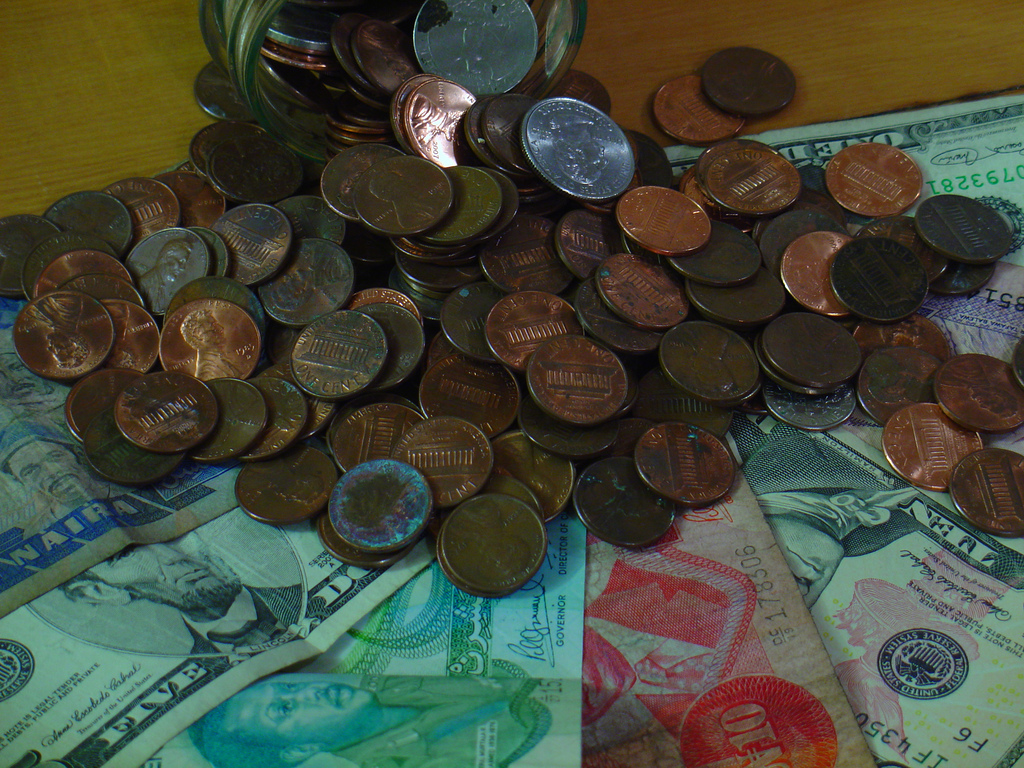“Naira’s fall hits prices and creates hunger”
July 1A fall in Nigeria’s currency value has affected the prices of commodities in the market, writes Gerald Nwokocha, 28, a Correspondent from Abuja, Nigeria, as he examines the impact of and solutions to the issue.
Official exchange rates at the Central Bank of Nigeria and the black market exchange rates differ. The slogan in the market place now is “na dollar cause am”. Meaning: US Dollar (USD) appreciation against the Nigeria Naira (NGN) caused an increment in prices of goods.
Consumers have expressed dissatisfaction over the hike in prices of commodities. Shockingly, transportation fare, which is usually a determinant factor that influences prices of commodities, has remained constant. Surveys show that in major cities like Kano, Lagos, Abuja, Onitsha and Port Harcourt the transportation costs for people, goods and services remained unchanged even when prices of commodities produced locally have escalated.
Charles Ademola narrated his experience when he stopped by the roadside to buy Suya meats. He questioned why a 700-naira Suya meat was so little. The seller, popularly called “Aboki”, said “this ‘Change’, e no good. Dollar don cost.” The implication is that the “Change” government Nigerians voted in appears not to be working, and the exchange rate has affected the price of Suya.
Beans are not left out. At markets in Abuja, a mudu (400gm) of beans was sold for 300 naira all through 2015. Currently, it is sold for 400 naira. However, fresh vegetables such as waterleaves and pumpkin leaves (Ugu) seem to have maintained stable prices nationwide, perhaps because of their relative abundance.
One would ask, “what has the exchange rate to do with goods and foodstuffs produced locally in the country?” One local soap manufacturer decried the high cost in servicing equipment as a reason, some said poor electricity supply and a hike in tariff were reasons behind sharp rise in their products.
SBM Intelligence, a Lagos-based research firm said commodity prices increased in virtually every segment of household goods and consumables, which indicates the effect of the weakening of the Naira against the dollar.
In some quarters, it is said that insurgence attacks in the areas where produce is harvested, plus exchange rate fluctuations, are major reasons for the price increase, and a possible devaluation of the Naira could make the situation even worse since Nigeria is an import-based economy.
Apparently, 216 naira to a dollar as witnessed in the tail end of the past administration in Nigeria wasn’t okay. But having a dollar being exchanged at over N300 is worse and more worrisome. Definitely, this is not the CHANGE mantra Nigerians bargained for. Prices of food items have kept increasing, without a proportionate rise in the income of average Nigerians. Yet, some state governors are talking about cutting the 18,000 naira minimum wage of workers, while others are sacking some of their workforce. The Nigeria Electricity Regulatory Commission on the other hand, went ahead to increase the electricity tariff, even when most Nigerians can’t boast of a four-hour steady supply in a day. There has been so much hardship imposed, even when there is no commensurate increase in salaries and wages of workers.
Nelson Mandela once said, “poverty is man-made”. Some people are opportunist and are willing to prey on each other. They capitalise on the disadvantages of another to enrich themselves.
Nigeria’s economy seemed to be regulated largely by external forces. This is the real situation and the government has to do something urgently to salvage the economy, halt further depreciation of the naira and save the masses from hunger. Already, most Nigerians can no longer afford goods in the market. If this continues, it may encourage robbery and corruption, which the present administration is investing resources to tackle.
Transport policies must be robust for easy movement of people, goods and services. There have to be access roads from the hinterlands to the cities for easy movement of goods and farm produce. This factor alone can make a difference in prices of goods.
The ongoing national economic conference in the country should be able to address this challenge and several other challenges befalling the nation.
photo credit: M is for Money via photopin (license)
…………………………………………………………………………………………………………………
About me: I’m an apostle of positive change who possesses leadership acumen and intellectual values. My work in investigative journalism and community service has helped to improve human condition.
I am the principal author of “The Metamorphoses of Nigeria”. Via the book, I interviewed Nigeria’s President Muhammadu Buhari, and former Commonwealth Secretary-General Chief Emeka Anyaoku.
I am a game-changer with a track record of excellence, and passion about teamwork and Africa. I live in Nigeria’s capital, Abuja.
…………………………………………………………………………………………………………………
Opinions expressed in this article are those of the author and do not necessarily represent the views of the Commonwealth Youth Programme. Articles are published in a spirit of dialogue, respect and understanding. If you disagree, why not submit a response?
To learn more about becoming a Commonwealth Correspondent please visit: http://www.yourcommonwealth.org/submit-articles/
…………………………………………………………………………………………………………………





